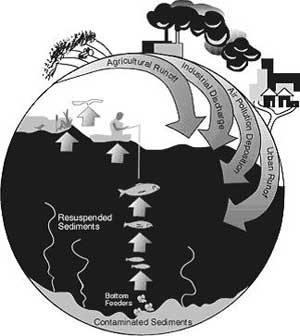Ecological change - A threat to human health
 According to a recent report by the World Health Organization (WHO), the emergence of more and more new killer diseases such as SARS and bird flu may be related to environmental destruction.
According to a recent report by the World Health Organization (WHO), the emergence of more and more new killer diseases such as SARS and bird flu may be related to environmental destruction.
Maria Neira, Director of WHO's Department of Human Environmental Protection said: 'Human health is closely related to the' health 'of ecosystems, which meet many of their vital needs. I '. The report, with contributions from more than 1,300 experts around the world, suggests that the process of population growth and economic development has rapidly transformed global ecosystems and this affects human health.
Natural resources such as water, food, fuel and climate play an important role in preventing disease and maintaining good health because many human diseases originate in animals. Diseases such as flu, tuberculosis and measles outbreak in the population after the disease 'jumps' from pets including chickens, cattle and dogs. The consequence of human-induced actions makes the structure of the world's ecosystems change faster in the second half of the 20th century compared to other periods in history. About 60% of the ecosystem's benefits to support life on Earth have been undermined and overused. The disastrous consequences for human health have been noticed and may become worse in the next 50 years.
WHO believes that regions facing the highest risk of ecosystems include sub-Saharan Africa, Central Asia, parts of Latin America, South Asia and Southeast Asia. Neira said that for the poor, they may face problems related to food production, especially droughts and floods. And the risk of natural disasters is increasing. ' Other issues of concern are nutrition when fish stocks decline while the area of cultivated land is shrinking, which is the factor leading to malnutrition of about 800 million people worldwide, near as all are in poor countries. Each year, water-related infectious diseases have claimed 3.2 million lives, accounting for about 6% of all deaths. Currently, more than 1 billion people lack access to clean water and 2.6 billion people live in unsanitary conditions.
- Leeches can be problematic like yellow snails
- Climate change adversely affects health
- Obesity is a threat to the planet
- Dangerous climate change like HIV / AIDS
- Rare animals in Truong Son range call for help
- Singapore built the first ecological bridge in Southeast Asia
- Dangerous prevention from hazardous chemicals
- Enjoy watching the ecological house ... snail picture
- What happens to humanity when the temperature of the earth increases by 4 degrees C?
- The plains in the world are under threat
- How is climate change damaging our health?
- The smartest and most ecological building on the planet
 Is the magnetic North Pole shift dangerous to humanity?
Is the magnetic North Pole shift dangerous to humanity? Washington legalizes the recycling of human bodies into fertilizer
Washington legalizes the recycling of human bodies into fertilizer Lightning stone - the mysterious guest
Lightning stone - the mysterious guest Stunned by the mysterious sunset, strange appearance
Stunned by the mysterious sunset, strange appearance